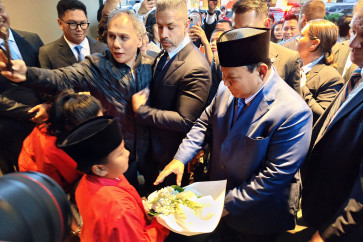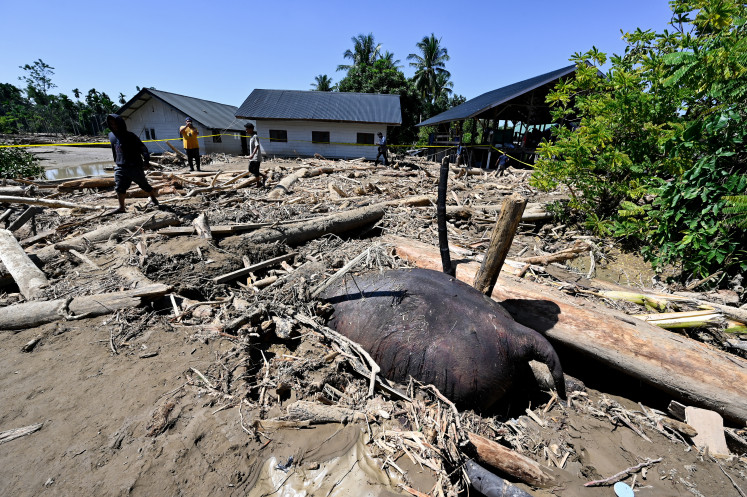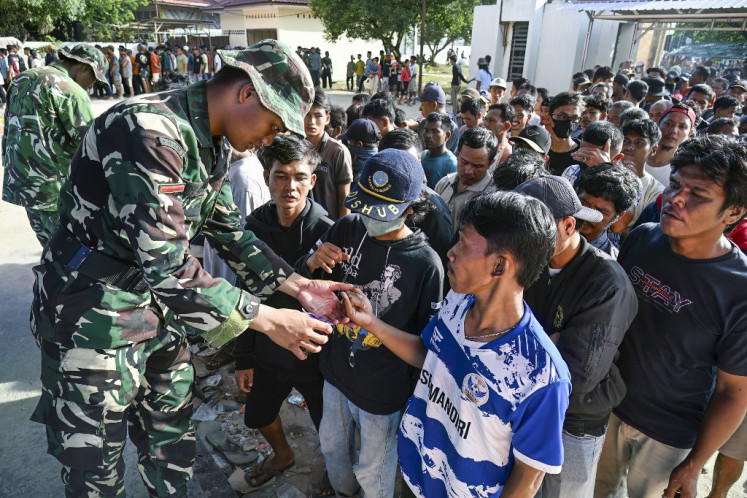Popular Reads
Top Results
Can't find what you're looking for?
View all search resultsPopular Reads
Top Results
Can't find what you're looking for?
View all search resultsCommentary: Governance under Jokowi: So far so good
Going into his second month in office, President Joko âJokowiâ Widodo has done quite a lot to allay concerns that his weak political position, particularly against a determined and bitter opposition in the House of Representatives, could prevent him from pushing his ambitious reform agenda
Change text size
Gift Premium Articles
to Anyone
G
oing into his second month in office, President Joko 'Jokowi' Widodo has done quite a lot to allay concerns that his weak political position, particularly against a determined and bitter opposition in the House of Representatives, could prevent him from pushing his ambitious reform agenda.
Jokowi has already put in place the massive welfare programs he promised during the election campaign. He has survived a major test when he raised domestic fuel prices last week. He has even traveled abroad for a whole week to tout his new vision of Indonesia as a maritime power and to do a little bit of salesmanship to invite investors to help with Indonesia's development.
He's accomplished all this and a lot more since his inauguration on Oct. 20.
Going by his first month's performance, governance under Jokowi is looking good, if not promising. Some analysts attribute this to circumstances conducive to his presidency. His leadership, which will be the key to compensating for his weak political position, has yet to be fully tested.
Jokowi goes down as the weakest of all seven presidents Indonesia has had. His predecessors controlled a major political party, the House or the powerful military ' or all three. He controls none.
Jokowi has no real political force to fall back on other than the popular support he enjoyed at the polls in July. Even then, he won just 53 percent of the vote, not the landslide that his predecessor Susilo Bambang Yudhoyono enjoyed in the elections of 2004 and 2009.
So far, Jokowi has relied on public support, with volunteers mobilizing public opinion, to help with his political battles, as he did in putting together his Cabinet. But public opinion can be easily swayed and never entirely relied upon, certainly not for the entire five years Jokowi will be in office.
The House is controlled by the Red-and-White Coalition of political parties that support Prabowo Subianto, who lost his presidential bid to Jokowi. They remain bitter to this day after their narrow loss and have the potential to block or frustrate the President's policies.
The President has little to no say in running the political parties within his ruling coalition. The biggest of them, the Indonesian Democratic Party of Struggle (PDI-P), remains in the hands of former president Megawati Soekarnoputri. It too can frustrate or undermine his presidency, unless its interests are accommodated in the government.
Jokowi, therefore, has to fight political battles on multiple levels; first within his own coalition government and second in the House. And then there is public opinion, with expectation running high for him to deliver.
The fact that he has not only survived thus far, but also managed to launch various reform programs may be indicative of his leadership skills and the popular support he enjoys.
The opposition coalition, which controls the People's Consultative Assembly (MPR), threatened to boycott the presidential inauguration on Oct. 20, but it backed off when it became clear that doing so would have been an unpopular move.
In forming the Cabinet, Jokowi had to make compromises to accommodate the interests of the political parties that had supported his election. But the lineup suggests he has a team that is solidly united behind his vision of Indonesia. The ministers, who come from different political backgrounds, have been consistent in saying there is but one vision guiding them: the Jokowi vision.
Jokowi was able to quickly find the money to finance his costly welfare programs that give the poor people various entitlements though electronic cards. He needed to do this to shield the poor from the impact of his next bold move: raising fuel prices, which has historically triggered massive protests.
When he raised fuel prices by about 30 percent last week, the protests were scattered; some broke into skirmishes with police, but they were not large enough to be disruptive.
A massive public campaign, telling people that he is phasing out the fuel subsidy, which is largely enjoyed by the wealthy, to fund social programs for the poor has convinced the public at large to limit the protests and the opposition, some of which came from within the PDI-P.
Jokowi passed the biggest test of his presidency so far.
In his first month, he traveled to Beijing, Naypyitaw and Brisbane, Australia, for a series of summits and meetings with world leaders, including Xi Jinping of China and Barack Obama of the US. He defied the early public image of him as a domestic-issues president who cares little about foreign policy.
His Cabinet members have also been doing their part, reaching out to members of the public and doing their share of blusukan (impromptu visits), Jokowi's trademark practice of talking to and listening directly to the people. The American Chamber of Commerce in Indonesia managed to bring six top Cabinet members to talk to potential investors at a conference in Jakarta.
In their first month, Jokowi and his team lived up to their name as the Working Cabinet, as well as their motto of 'work, work, work', delivering a few early results.
By contrast, the House, which was inaugurated on Oct. 1, began working only last week after weeks of infighting over the distribution of top seats between the different political parties. Jokowi's detractors in the House have not been able to block any of his reform programs.
The real fighting with the House, however, will likely begin soon. Whether governance will be as good as it was in the first month depends very much on how Jokowi uses the power and influence that comes with his position ' and his leadership skills.
His first month's performance was encouraging.
____________
The writer is senior editor of The Jakarta Post










